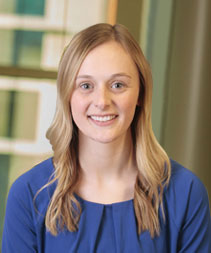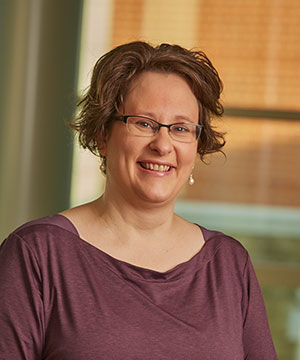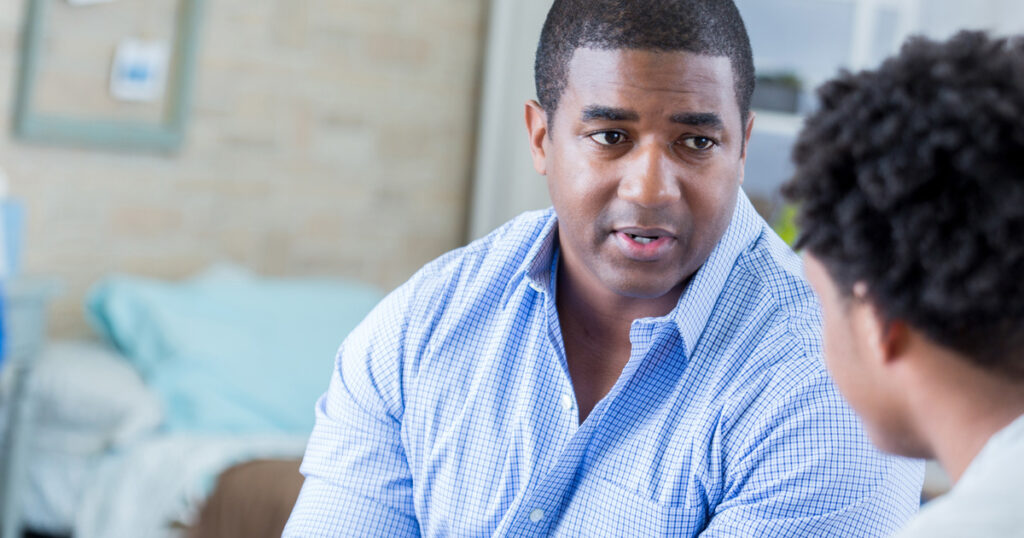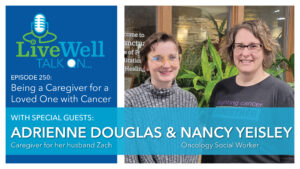Helen G. Nassif Community Cancer Center oncology social workers, Brittany Greig and Nancy Yeisley, share advice on how to have the difficult conversation of telling a child that a parent or loved one has cancer.
When sitting down with your child to have this conversation, the guiding principle should be to tell the truth in a way that the child will be able to understand and prepare themselves for changes that will happen in the family. Kids usually like routine, which helps them feel safe. If life becomes unpredictable, they will likely need help adjusting to the changes.
Young children (up to age 8) won’t need a lot of detailed information, while older kids (8-12 years) and teens will need to know more. Teens, who are becoming more independent, will have different concerns and questions than a five-year-old who relies on their parents for basic caregiving needs.
What All Children Need To Know
- Call it cancer. Giving it a name helps to define it and makes it distinctly different than being sick with a cold or the flu.
- The area of the body where the cancer is.
- What’s the plan? – Chemo, radiation and surgery are the three basic ways to treat cancer.
- How their lives will be affected – What will be different and what will stay the same. Address both to create balance and reassurance.
- Physical changes the parent or loved one will go through (hair loss, weight change etc.)
How To Choose A Time To Talk
Make sure you have time to answer their questions and plan to avoid interruptions before you start talking. You may consider talking to each child separately so that the conversation can be tailored to each child’s age and understanding. This can also allow you to pay closer attention to each child’s individual response. The child may also feel more comfortable asking questions in a one-on-one setting (an older sibling may not ask questions in front of a younger sibling).
However, sometimes telling kids together avoids potential pitfalls of who was told first vs second, etc. Telling kids together can also set the tone of open family communication, no secrets and “we are in this together.” Do what works best for your family.
Choose a time when you are feeling calm. If you are upset or unsure of what you will say, it may be better to wait until your emotions are more under control.
“It’s okay to not tell them everything the same day you receive your diagnosis,” says Yeisley. “You may need to process it yourself first. However, you also should factor in the possibility of them over-hearing a conversation or sensing something is wrong. Don’t delay it too long.”
“It is important they hear about the cancer from you,” says Greig. “This gives you the ability to determine what information to share and allows you to set the tone.”
Parents don’t need to pretend there is nothing to worry about. It’s okay for a child to see you cry. Parents can model this is an upsetting time, cancer is scary and it’s okay to be sad. Stress none of this means the family won’t be able to handle it.
In a two-parent household, it’s best for both parents to be present for the conversation. For single parents, it may not be possible to have the other parent present, so you may also consider an adult relative or friend who is a stable, consistent influence in the child’s life.
It Helps To Plan How You’ll Talk To Them About Cancer
- Ask your oncology social worker for help planning out what you want to say and how you will answer questions on a level the child can understand
- Think of questions they may ask ahead of time, so you are less likely to be caught off guard
- If you don’t have an answer for a question, be honest and say you don’t know but will help them find the information
- Try to lay groundwork for an open line of communication – let them know they can come to you with concerns, needs and fears
- Help identify other adults they can talk to as well
- Check in with each child regularly, during and after treatment. It can be a great comfort to them even if they don’t say much.
Children May Blame Themselves
Besides the cancer itself, children may worry about other things. A common worry is that something they did or did not do may have caused this to happen. We know that’s not true, but some children believe this at some point.
Children may also believe this happened because they have been angry at/with the parent or loved one. Reassure them even if they don’t outwardly express this feeling so they don’t have feelings of guilt. You can say something like, “The doctors told us that no one can cause someone to get cancer – it’s nothing that any of us made happen.”
You may need to reassure teens in a different way. The teen and parent or loved one may have been fighting a lot and the teen may feel that they didn’t appreciate them enough, so they may feel the cancer is a way to punish them. Say something like, “I know you and I (or the loved one) have been arguing a lot, but that has nothing to do with the cancer.”
Children may worry about “catching” cancer and/or about death
Younger children may worry that the cancer is contagious, and they could catch it, or that everyone dies from it, or the other parent will get it too. It’s best to address these concerns before the child has a chance to worry. Explain that cancer is different from a cold and that nobody “passed it on” through germs and they won’t get it by touching or hugging their loved one with cancer.
Stress that there are more cures or treatment options available. You could tell the child something like, “Years ago, people often died from cancer because we didn’t know much about how to treat it. Doctors have learned a lot more since then, and there are treatments that can cure many cancers.” If it is true, add “Nobody is talking about me dying, and I would tell you if they did.”
Review The Main Points
- No one caused you to get cancer and it’s not the child’s fault
- You can’t catch it – it’s okay to hug or kiss the person with cancer
- The family will work together to cope with the cancer and it’s treatment
- Even though the sick parent or loved one may not feel well enough to spend as much time with them, the children are loved and will still be cared for
Communicate With the Other Adults in Their Lives
Parents and other adults in the child’s life can serve as examples and remind the child of these things. Also, be sure to keep checking in with the children and keep communication ongoing.
“You should also tell their school and/or daycare about the cancer,” says Yeisley. “It will put those adults in the best position to be supportive of the children.”
“Parents of the child’s best friend are also good people to tell,” says Yeisley. “They can be supportive of your child and help their child to be a supportive friend to your child in return.”
Children will also need to understand some basic terms about cancer. See this list of “words to describe cancer and its treatment” from the American Cancer Society.
For more information about all resources that we provide to patients and their loved ones call us at (319) 558-4876.


Brittany Greig
LMSW
Nancy Yeisley
MSW, LISW, OSW-C,
Britany and Nancy are Oncology Social Workers at the Helen G. Nassif Community Cancer Center.







